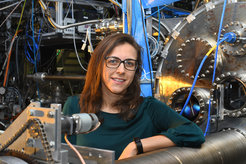Dr. Hanieh Fattahi on Minerva Fast Track Programme
Dr. Hanieh Fattahi, a young physicist at the Laboratory for Attosecond Physics (LAP) at the Ludwig-Maximilians-Universität Munich and the Max Planck Institute of Quantum Optics, has been chosen for the Max Planck Society’s Minerva Fast Track Programme.
On an annual basis, the programme currently supports two outstanding postdoctoral female scientists from the fields of the CPTS (Chemistry, Physics and Technology) Section to plan their careers in a more targeted way.

As the name of the programme suggests, it aims to pave the way towards establishing an own research group. In the first phase a three years position is funded by the Max Planck Society. This first phase includes a stay at an internationally renowned Research Institute for an extended period. From June 2017 on Hanieh Fattahi will work in the group of Prof. Sunney Xie at Harvard University (Boston, USA) for one year. When she will be back at MPQ, she will be able to set up a group with two PhD Students. Funds for the equipment and personnel resources will be made by the Institute. After this first stage she can apply for a Max Planck Research Group with a funding period of five years.
Hanieh Fattahi studied biophysics at Sharif-University in Teheran where she received her Master of Science in Applied Physics in 2007. In her thesis she investigated the effect of laser irradiation on collagen bundles in the skin. Afterwards, she was accepted at the International Max Planck Research School for Advanced Photon Science (IMPRS-APS), joining the Laboratory for Attosecond Physics headed by Professor Krausz. In 2015 she received her doctoral degree with summa cum laude on the topic “Third Generation Femtosecond Technology”. Since then she has been leading a group in laser development with the focus on waveform synthesis and four-dimensional imaging of electronic motion.
Since 2016 she has been Co-coordinator of the IMPRS-APS. In addition, she became Fellow of the Max Planck Center for Extreme and Quantum Photonics in Ottawa (Canada) in 2016.
Within the Minerva programme, Fattahi and her team will develop an innovative micro-spectroscopy tool for lable-free imaging of biological samples. The new tool combines femtosecond stimulated Raman spectroscopy and field-resolved detection in order to achieve a higher sensitivity for distinguishing molecular fingerprint. This novel method keeps promise for in-vivo, early detection of cancerous cells.
Hanieh Fattahi is member of several scientific organizations, such as the Optical Society of America (OSA), the German Physical Society, and Young Professional Member of the OSA. She is also member of the executive committee of the OSA technical group “Short Wavelength Sources and Attosecond/ High Field Physics” and at present president of the “Young Mind Section of Munich” (ALPS) of the European Physical Society (EPS). Olivia Meyer-Streng
